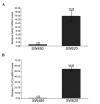Discovery of genes from feces correlated with colorectal cancer progression
- PMID: 27900008
- PMCID: PMC5103954
- DOI: 10.3892/ol.2016.5069
Discovery of genes from feces correlated with colorectal cancer progression
Abstract
Colorectal cancer (CRC) is considered to develop slowly via a progressive accumulation of genetic mutations. Markers of CRC may serve to provide the basis for decision-making, and may assist in cancer prevention, detection and prognostic prediction. DNA and messenger (m)RNA molecules that are present in human feces faithfully represent CRC manifestations. In the present study, exogenous mouse cells verified the feasibility of total fecal RNA as a marker of CRC. Furthermore, five significant genes encoding solute carrier family 15, member 4 (SLC15A4), cluster of differentiation (CD)44, 3-oxoacid CoA-transferase 1 (OXCT1), placenta-specific 8 (PLAC8) and growth arrest-specific 2 (GAS2), which are differentially expressed in the feces of CRC patients, were verified in different CRC cell lines using quantitative polymerase chain reaction. The present study demonstrated that the mRNA level of SLC15A4 was increased in the majority of CRC cell lines evaluated (SW1116, LS123, Caco-2 and T84). An increased level of CD44 mRNA was only detected in an early-stage CRC cell line, SW1116, whereas OXCT1 was expressed at higher levels in the metastatic CRC cell line CC-M3. In addition, two genes, PLAC8 and GAS2, were highly expressed in the recurrent CRC cell line SW620. Genes identified in the feces of CRC patients differed according to their clinical characteristics, and this differential expression was also detected in the corresponding CRC cell lines. In conclusion, feces represent a good marker of CRC and can be interpreted through the appropriate CRC cell lines.
Keywords: 3-oxoacid CoA-transferase 1; cluster of differentiation 44; colorectal cancer; fecal RNA; growth arrest-specific 2; member 4; placenta-specific 8; serine/threonine kinase 17b; solute carrier family 15.
Figures





Similar articles
-
SLC25A22 Promotes Proliferation and Survival of Colorectal Cancer Cells With KRAS Mutations and Xenograft Tumor Progression in Mice via Intracellular Synthesis of Aspartate.Gastroenterology. 2016 Nov;151(5):945-960.e6. doi: 10.1053/j.gastro.2016.07.011. Epub 2016 Jul 21. Gastroenterology. 2016. PMID: 27451147
-
Upregulation of the growth arrest-specific-2 in recurrent colorectal cancers, and its susceptibility to chemotherapy in a model cell system.Biochim Biophys Acta. 2016 Jul;1862(7):1345-53. doi: 10.1016/j.bbadis.2016.04.010. Epub 2016 Apr 13. Biochim Biophys Acta. 2016. PMID: 27085973
-
Data on clinical significance of GAS2 in colorectal cancer cells.Data Brief. 2016 May 11;8:82-6. doi: 10.1016/j.dib.2016.05.010. eCollection 2016 Sep. Data Brief. 2016. PMID: 27284567 Free PMC article.
-
ZNF703 promotes tumor cell proliferation and invasion and predicts poor prognosis in patients with colorectal cancer.Oncol Rep. 2014 Sep;32(3):1071-7. doi: 10.3892/or.2014.3313. Epub 2014 Jul 7. Oncol Rep. 2014. PMID: 25017610
-
New molecular diagnosis and screening methods for colorectal cancer using fecal protein, DNA and RNA.Expert Rev Mol Diagn. 2014 Jan;14(1):107-20. doi: 10.1586/14737159.2014.863152. Epub 2013 Nov 28. Expert Rev Mol Diagn. 2014. PMID: 24308334 Review.
Cited by
-
Whole exome sequencing identifies novel germline variants of SLC15A4 gene as potentially cancer predisposing in familial colorectal cancer.Mol Genet Genomics. 2022 Jul;297(4):965-979. doi: 10.1007/s00438-022-01896-0. Epub 2022 May 13. Mol Genet Genomics. 2022. PMID: 35562597 Free PMC article.
-
Fecal microRNAs as Innovative Biomarkers of Intestinal Diseases and Effective Players in Host-Microbiome Interactions.Cancers (Basel). 2020 Aug 5;12(8):2174. doi: 10.3390/cancers12082174. Cancers (Basel). 2020. PMID: 32764361 Free PMC article. Review.
-
Gut butyrate-producing organisms correlate to Placenta Specific 8 protein: Importance to colorectal cancer progression.J Adv Res. 2019 Nov 16;22:7-20. doi: 10.1016/j.jare.2019.11.005. eCollection 2020 Mar. J Adv Res. 2019. PMID: 31956438 Free PMC article.
-
SLC15A4 Serves as a Novel Prognostic Biomarker and Target for Lung Adenocarcinoma.Front Genet. 2021 Jun 8;12:666607. doi: 10.3389/fgene.2021.666607. eCollection 2021. Front Genet. 2021. PMID: 34168674 Free PMC article.
-
Metabolic heterogeneity in cancer.Nat Metab. 2024 Jan;6(1):18-38. doi: 10.1038/s42255-023-00963-z. Epub 2024 Jan 24. Nat Metab. 2024. PMID: 38267631 Review.
References
LinkOut - more resources
Full Text Sources
Other Literature Sources
Miscellaneous
